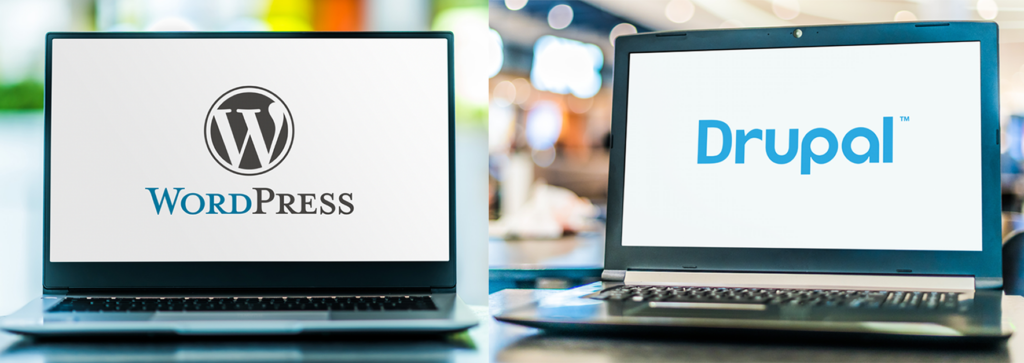

WordPress vs. Drupal: Which CMS is Right for You?
Discover the key differences between these two powerful CMS solutions.
In today’s digital-first world, selecting the right content management system (CMS) is a critical choice for delivering seamless online experiences and ensuring long-term growth.
Your CMS must align with your current needs, but there are future considerations as well. The right CMS must also give you the flexibility to scale as your business and technology evolve. Choosing the right CMS is crucial for maintaining a competitive edge, with far ranging impacts on ease of use, customizations, and security.
To help you make an informed decision, this ebook provides a detailed comparison of two popular CMS platforms—WordPress®[1] and Drupal—allowing you to choose the solution that best positions your business for ongoing success and future growth.
What’s inside?
The many CMS options available available can make choosing the right one feel overwhelming. This comprehensive guide simplifies the process, breaking down the differences between two popular CMS solutions, WordPress and Drupal, and focusing on the areas that matter most to your business.
Download the ebook to learn more about:
- Ease of use: Why WordPress offers an accessible experience for users and developers alike, while Drupal’s steeper learning curve may be best suited for more complex builds.
- Customization and flexibility: Learn how both platforms handle content management and adaptability, from WordPress’s user-friendly block editor to Drupal’s advanced modular system.
- Security and scalability: We explore which CMS is best equipped for enterprise security and how each handles large-scale traffic.
- Cost and ROI: A detailed look at the total cost of ownership for both platforms and which CMS provides better long-term value.

WordPress vs. Drupal:
A side-by-side comparison
Here’s a glimpse of the critical areas explored in the ebook, providing a detailed look at how WordPress and Drupal compare across various categories:
- User experience:
WordPress enables developers and designers to streamline workflows, speed up time to market, and achieve higher return on investment (ROI), while Drupal’s more complex interface can often make it inaccessible to non-developers. - Content management tools:
WordPress’s intuitive block-based editor, Gutenberg, allows easy content creation without needing code, offering flexibility for both technical and non-technical users. In contrast, Drupal offers more advanced customization but relies heavily on technical expertise for content updates and management. - Versatility and adaptability:
WordPress’s agility shines in rapidly changing environments, allowing users to iterate quickly, test new designs, and roll out campaigns faster. Drupal, while highly customizable, is best suited for static, long-term projects with little need for constant adaptation. - Security:
Drupal is known for its enterprise-grade security and is often favored by organizations with stringent security needs. WordPress, on the other hand, remains highly secure when regularly maintained, with managed hosting solutions offering enhanced protection.
WordPress as a CMS:
Flexibility for growing businesses
One of the major reasons WordPress is the most popular CMS in the world is its unparalleled flexibility. Whether you’re running a personal blog or a full-scale enterprise website, WordPress adapts to your needs.
With nearly 60,000 plugins in the WordPress plugin repository alone, you can extend site functionality endlessly—whether through integrations with eCommerce platforms, marketing tools, or other third-party applications.
Additionally, WordPress’ block-based editor can be a powerful tool for building dynamic digital experiences and optimizing them quickly.
“The absolute beauty of blocks in WordPress from a UX perspective is two-fold,” explains Scott Jones, Founder and CEO of Illustrate Digital.
“The ability to change blocks on a page quickly, or create a new page with blocks in a different order, is amazingly powerful for A/B testing to change the importance of particular items.”
By contrast, Drupal is best suited for highly technical builds where extensive customization is required. For businesses that need to frequently update their site, launch new campaigns, or scale quickly, WordPress offers agility that’s difficult to match.

Security, scalability, and performance
Security is paramount for any business. WordPress, though sometimes seen as more vulnerable due to its popularity, is just as secure as any other CMS when properly maintained. WordPress’s massive community of developers constantly works on patches, updates, and security enhancements.
Drupal, while less widely used, is recognized for its ironclad security architecture, making it a favorite among government organizations and enterprises with complex data needs.
Both CMSs can support large-scale websites when it comes to scalability, but the learning curve and resources required for Drupal often make WordPress a more appealing option for businesses that need to grow quickly without massive upfront costs.
Cost and return on investment
Cost is always a significant factor when choosing a CMS. Because it’s open source, highly flexible, and less reliant on developers, WordPress generally offers a lower total cost of ownership compared to Drupal.
WordPress’s extensive library of free and premium plugins can further extend its functionality without incurring high development costs. Drupal, however, often requires more specialized talent, which increases development and maintenance expenses.
The ability to quickly launch and iterate with WordPress also often translates into a faster ROI for businesses focused on agility and customer experience.
Ready to make a decision?
Download the complete ebook for a deep dive into the differences between WordPress and Drupal, and discover which CMS can help you achieve your business goals.
Whether you’re a small business or an enterprise organization, download this guide for the insights you need to select the right CMS for your next digital project.
